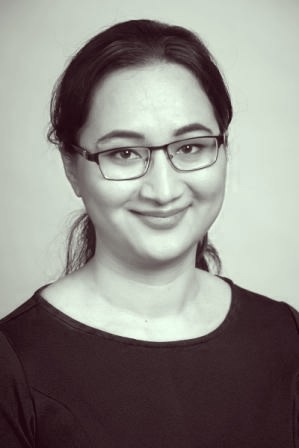 Dr. Bhawana Thakur (@thakurbhawana19), Technical University of Munich, is taking part in Soapbox Science Munich 2019 with the talk:“Catch Me If You Can: Pathogen Detection in Drinking Water“
Dr. Bhawana Thakur (@thakurbhawana19), Technical University of Munich, is taking part in Soapbox Science Munich 2019 with the talk:“Catch Me If You Can: Pathogen Detection in Drinking Water“
Soapbox Science Munich: Did you choose a scientific career or did the scientific career choose you?
Dr. Bhawana Thakur: Right from my school days I was interested in science. If not research, then I would have definitely chosen a career related to science like being a science educator or an industrial job in R and D sector. The motivation to aim for a research job in academia solely goes to Prof. Lakshmy Ravishankar. I was lucky to have her as a teacher during my bachelor’s course. It was during this time that I finally decided where I wanted to be. Her passion for chemistry is so contagious that it has motivated many of my college mates to take a challenging career path like academia.
SSM: What was the key event that brought you to the place where you are now?
BT: After my marriage, I relocated to Europe. Prior to this I was working as a postdoc in University of Wisconsin-Milwaukee, USA. In Europe, I was looking for a research lab to continue my work in the field of biosensors. I was fortunate enough to come across Eurotech Marie Curie Postdoctoral programme and two institutes (TUM, and EPFL) who were willing to host me. Together, we wrote a grant proposal which got accepted for funding.
SSM: What’s your favourite daily scientific superhero power?
BT: Since I belong predominantly to the sensing field my daily superhero power is to catch and detect the tiny notorious pathogens that can be nasty and deadly for mankind.
SSM: What is the most exciting aspect of your research?
BT: Getting data through rigorous experimentation to prove the hypothesis is the most exciting part of my research. Although this does not happen every now and then, the journey which is a big roller coaster ride is riveting in itself.
SSM: What motivates you to give a talk in Soapbox science?
BT: I am interested and committed towards science communication and Soapbox science is therefore an ideal platform. Being in research field for almost 9 years has given me a sense of responsibility towards society. I believe it is my duty to educate my fellow citizens with the knowledge, which I have gained in all these years. This knowledge in turn enables the non-scientific community to appreciate the work of researchers. It is an excellent approach to motivate young students to take science as a career, thereby contributing to the future pool of scientists. Instilling scientific thinking in the public is crucial to have a vibrant and well-functioning society. An added impetus towards this endeavour is that my research work at TUM is funded by European Commission Horizon 2020 (H2020). H2020 and many such EU research and innovation programmes strongly encourage the researchers for an active involvement in science communication.
SSM: Do you have a few words to inspire other female scientists?
BT: Making a career in STEM is more challenging job for women compared to men. Things are changing though, and policies from the EU and Universities are helping female researchers to bridge this divide. Moreover, a deep passion and love for science can provide enough fuel to keep oneself motivated to work hard for achieving this career goal. It is important to surround yourself with the right people who believe in you. Take advantage of social media to learn new things and for networking opportunities. From my experience, I can say that research exposure in international laboratories, especially for aspiring women scientists from developing economies can be very beneficial.
SSM: What can we do to attract more women to STEM fields?
BT: To attract more women towards STEM careers it is important to understand the current demographics of the research field. Women researchers often struggle to maintain work life balance. It is essential to devise policies that will accommodate career breaks and allow effective reintegration. I have seen many women as early career researchers in STEM. However, not many continue their career path in this direction on a longer run. Schemes like the Career Restart (CAR) Panel-Marie-Sklodowska Curie fellowship go a long way in bringing back the talent and the female diaspora in the STEM community. It will be nice to have many more such programmes designed specifically for women.
